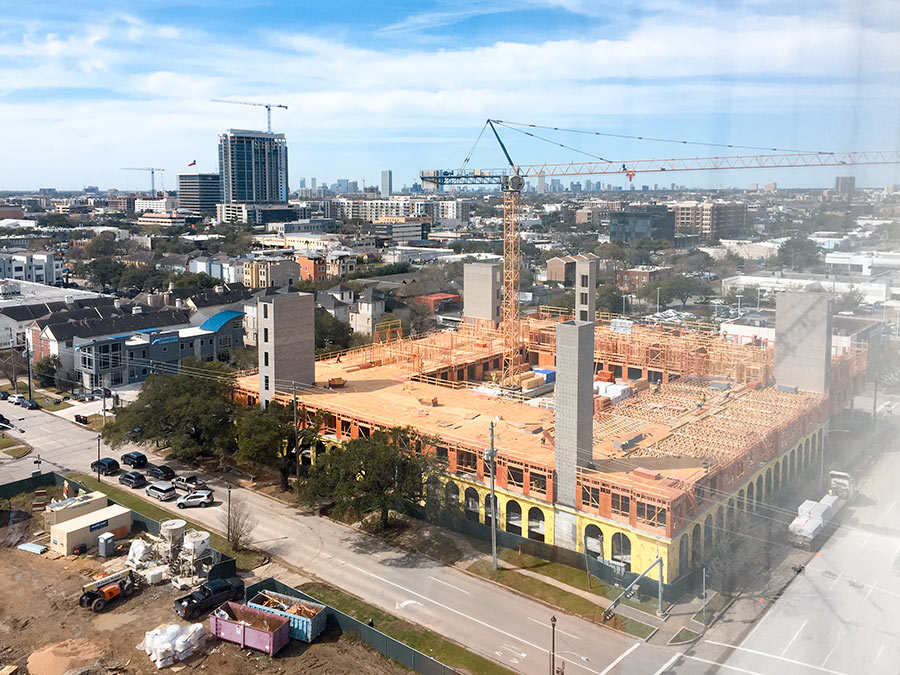HOW THE CITY SKIPPED OUT ON A SUNNYSIDE APARTMENT COMPLEX FOR THE PAST 9 YEARS  How does a 24-unit apartment building — one of those 1,000-plus Houston complexes the University of Texas School of Law’s recent study identifies as missing a Certificate of Occupancy — go nearly a decade without having the document? In 2012, public works inspected the Bellfort Townhomes on Bellfort St. between Cullen and Scott and called it a “material risk to the physical safety or health of the building’s tenants.” The building’s owner told an inspector that he’d apply for a Certificate — granted after landlords bring their buildings into compliance with city code — when the city contacted him the next year. But then, public works simply lost track of things. For 3 years starting in 2014, the department had no contact with 4410 Bellfort until it came time for the building’s next inspection last January — which resulted in the same findings as the previous one. Why the lapse? “According to the head of Houston’s Multi-Family Habitability Division, after the Division identified properties without a Certificate in the first round of inspections, the Division’s practice was to close the property’s inspection file as long as the owner submitted an application for a Certificate of Occupancy,” write researchers Heather K. Way and Carol Fraser, “even if the owner never successfully obtained the Certificate.” At least one group made sure to stay in touch with the city, though: “During this three-year period, tenants and nearby residents called 311 at least eight times to report sewage overflow issues at the property.” [UT School of Law Entrepreneurship and Community Clinic; previously on Swamplot] Photo of Bellfort Townhomes: Swamplot inbox
How does a 24-unit apartment building — one of those 1,000-plus Houston complexes the University of Texas School of Law’s recent study identifies as missing a Certificate of Occupancy — go nearly a decade without having the document? In 2012, public works inspected the Bellfort Townhomes on Bellfort St. between Cullen and Scott and called it a “material risk to the physical safety or health of the building’s tenants.” The building’s owner told an inspector that he’d apply for a Certificate — granted after landlords bring their buildings into compliance with city code — when the city contacted him the next year. But then, public works simply lost track of things. For 3 years starting in 2014, the department had no contact with 4410 Bellfort until it came time for the building’s next inspection last January — which resulted in the same findings as the previous one. Why the lapse? “According to the head of Houston’s Multi-Family Habitability Division, after the Division identified properties without a Certificate in the first round of inspections, the Division’s practice was to close the property’s inspection file as long as the owner submitted an application for a Certificate of Occupancy,” write researchers Heather K. Way and Carol Fraser, “even if the owner never successfully obtained the Certificate.” At least one group made sure to stay in touch with the city, though: “During this three-year period, tenants and nearby residents called 311 at least eight times to report sewage overflow issues at the property.” [UT School of Law Entrepreneurship and Community Clinic; previously on Swamplot] Photo of Bellfort Townhomes: Swamplot inbox





Something smells funny …. better follow the money
The guy should sell it for land value and let it be bulldozed. When the tenants (who are the ones who should decide if it’s good enough) say “Uh, so where do we go now?”, send them to the habitability office. They want to be landlords — let them be landlords. Though I guess they could do it since they don’t have to make a profit. They have unlimited tax dollars to waste.
or maybe the landlord could bring the building up to code and get a certificate of occupancy… people like cody say that if these tenants dont want their sewage overflowing, then they should move. well i say if these landlords find it to be too much of a hassle to comply with the law, then maybe they should find another line of work.
Love the username! Ha!
It probably has more to do with turnover at the Code Enforcement Office than any nefarious activity on anyone’s part.
.
That said, once again: I’m reminded that Houston desperately needs its own, local tenant and low income housing advocacy group. It shouldn’t be up to the Media to hound the City over neglected apartments. Just like we shouldn’t be going to advocates from Austin and Dallas and thinking they have any clue about what’s happening here.
codyhates: You’re making the same logical flaw that the people who push these laws make. I don’t support anyone living in sewage or anyone running a building like a slum. I’ve invested millions of dollars into fixing up properties that were ran by people like the dude in this story.
.
But if you REALLY think all those rules were put in place to “help” people, then all I can say is you should try buying a run down building and fixing it up. Tons – o – fun.
.
Cody: This Ayn Rand ish, “let the markets govern†approach is what gave India its slums, and Brazil its Favelas. When you take it to its logical end, it really doesn’t serve anyone at all. At some point laws are necessary for public safety.
.
To be sure there’s a lot to be desired in how the City of Houston enforces its building codes. But I think we can all appreciate those codes, whether we admit it or not.
But if you REALLY think all those rules were put in place to “help†people, then all I can say is you should try buying a run down building and fixing it up. Tons – o – fun.
Been there, done that and I didn’t even get a t-shirt. That said, I’d rather work with a well funded reasonable city inspectors office that values habitable spaces than compete with landlords offering knockdown prices for shanties. A fairly priced housing market will drive businesses to pay better wages because housing is the number one cost and people have a right to decent conditions. As a landlord, I’d like to make a living providing decent shelter than compete in a race to the bottom driven by a poorly regulated wage market supported by slums.
While I understand the frustrations of awful city management, competent and fair technocrats can really help local landlords and tenants make for better spaces and consistant revenues for all.